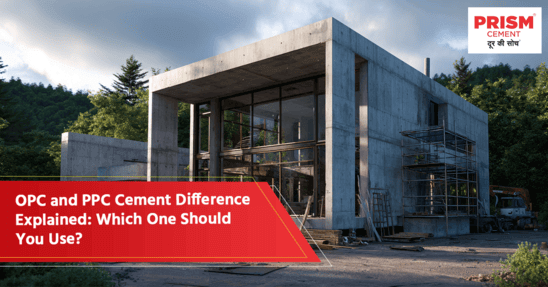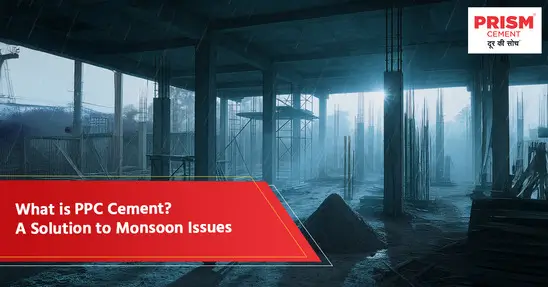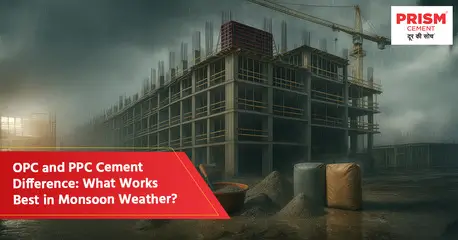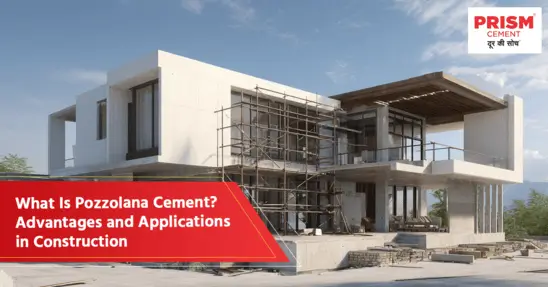When it comes to building a home or any concrete structure, choosing the right cement is crucial. Two commonly used types in the construction world are OPC and PPC cement. While both have their advantages, understanding the difference between OPC and PPC cement can help you make an informed decision for your next project.
In this blog, we break down the difference between OPC and PPC cement, their features, and help you decide which one truly fits your construction needs.
Full Form and Composition
Let’s start by decoding the basics of OPC and PPC cement.
- OPC stands for Ordinary Portland Cement. It is made by grinding clinker with gypsum. OPC usually contains 95% clinker and 5% gypsum.
- PPC stands for Portland Pozzolana Cement. It is produced by blending pozzolanic materials such as fly ash, volcanic ash, or silica fumes with clinker and gypsum. The typical composition is around 65–70% clinker, 25–30% pozzolanic material, and the rest gypsum.
Key Features
OPC Cement:
- Faster setting time
- High early strength
- Commonly used in precast and structural applications
PPC Cement:
- Slower setting, better long-term strength
- Improved workability
- Environment-friendly due to the use of pozzolanic materials
What Is PPC Cement?
Full Form and Composition
As mentioned, PPC cement or Portland Pozzolana Cement is made by mixing pozzolanic materials such as fly ash with clinker. These materials react with calcium hydroxide to form compounds that enhance the strength and durability of concrete.
Key Features
- Higher durability and resistance to chemicals and moisture
- Lower heat of hydration, reducing the risk of cracks
- Environmentally sustainable, as it makes use of industrial waste (fly ash)
- Better suited for general construction, mass concreting, plastering, and residential use
OPC vs PPC: Key Differences
Understanding the OPC and PPC cement difference across various parameters will help clarify where each is best used.
1. Strength Development
- OPC cement offers faster initial strength, which is ideal for time-sensitive projects.
- PPC cement, on the other hand, develops strength gradually but reaches comparable or even better long-term strength over time.
2. Durability
- PPC is more durable, especially in environments exposed to sulfate or moisture.
- It performs better in coastal, humid, or chemically aggressive areas, making it ideal for residential and long-term constructions.
3. Heat of Hydration
- OPC generates more heat during hydration, which can cause cracking in large pours.
- PPC has a lower heat of hydration, reducing thermal cracks and making it safer for mass concreting applications.
4. Cost
- PPC cement is generally more cost-effective than OPC due to the use of pozzolanic materials.
- Additionally, it requires less maintenance over time, making it economical in the long run.
5. Workability and Finish
- PPC offers better workability, especially useful for plastering and finishing work.
- OPC, while strong, tends to be less smooth during application.
Conclusion
When choosing between OPC and PPC cement, the decision should be based on the nature of your construction, budget, and long-term durability goals. If you are building a home in an area prone to moisture or want a structure that lasts beautifully for years, PPC cement is the smarter choice.
That’s why Prism Champion All Weather GOLDshield Cement, a premium PPC cement from Prism Cement, is specially formulated with water-repellent properties and crack resistance. It not only meets but exceeds BIS standards, keeping your home strong, beautiful, and protected in all weather conditions — “Har Mausam Mein Saath”.
Choose PPC- Choose long-term strength. Choose Prism Cement — the brand built on ‘Door ki Soch’.
FAQs
Q1. What is the main difference between OPC and PPC cement?
Answer: The main difference between OPC and PPC cement lies in their composition and performance. OPC provides faster initial strength, while PPC offers better durability and is more environmentally friendly.
Q2. Does the choice between OPC and PPC affect curing time and methods?
Answer: Yes. PPC cement usually requires a slightly longer curing time, but it results in better strength and crack resistance in the long run.
Q3. Which cement has a faster setting time, OPC or PPC?
Answer: OPC cement has a faster setting time, making it suitable for quick construction needs, whereas PPC sets slower but provides a better finish and longevity.
Q4. What are the environmental benefits of using PPC over OPC?
Answer: PPC uses industrial by-products such as fly ash, reducing carbon emissions and promoting sustainability. It also generates less heat during hydration, making it safer for the environment.
Q5. Is OPC better than PPC for structural components like beams and columns?
Answer: While OPC is traditionally used for structural components due to its early strength, modern PPC cement like Prism Champion Duratech offers excellent performance for critical applications like beams and columns with added benefits like chemical resistance and long-term durability.




